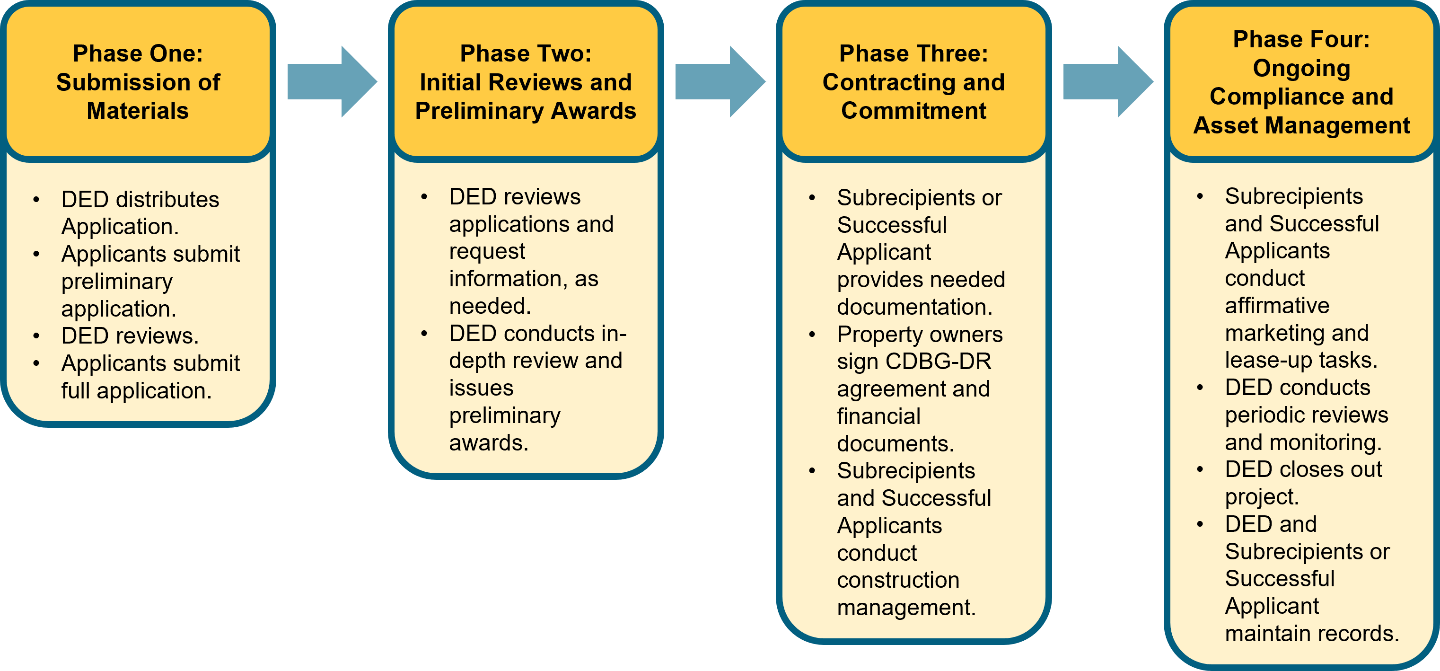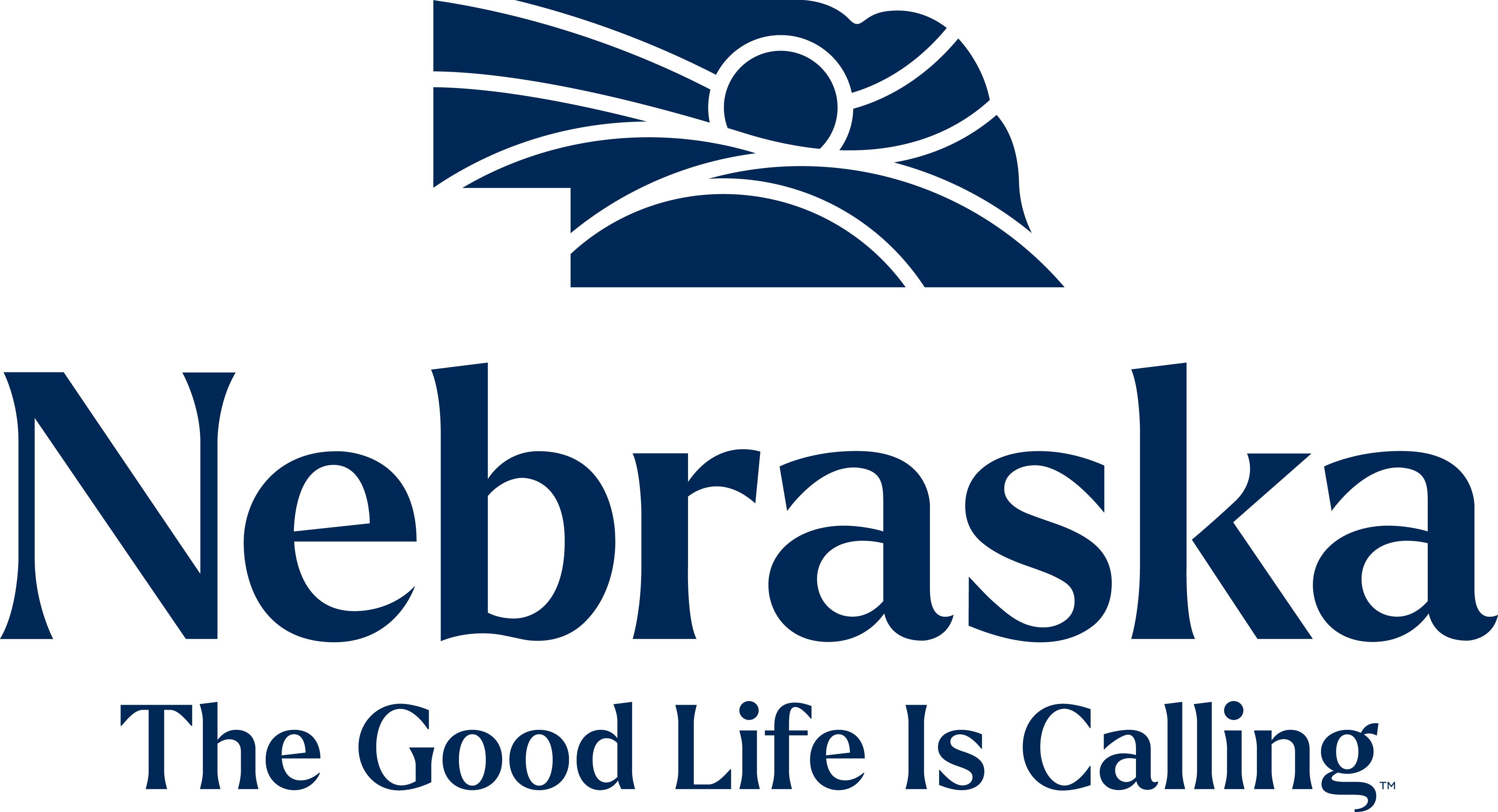Small/Non-LIHTC Rental Production Program

Purpose
The Small/Non-LIHTC Rental Production Program provides gap financing (i.e., loans) for the production of small affordable multi-family rental housing for projects not otherwise seeking Low-Income Housing Tax Credits (LIHTC) awards from the Nebraska Investment Finance Authority (NIFA). In most respects, the Small Rental Program is the same as the LIHTC Gap Program but is not administered jointly with NIFA. Successful applicants will be designated as “developers” for CDBG purposes and may include both non-profit and for-profit project owners.
Process Overview

Want to Learn More?
For a full overview of the program, see the Program Guidelines for Affordable Housing Construction: Small/Non-LIHTC Rental Production.
Cross-Cutting Requirements
This section includes icons that capture CDBG-DR cross-cutting program requirements.
-
Blue icons indicate requirements that Subrecipients must meet under this program. Click on each icon’s hyperlink for more information.
- Gray icons indicate requirements that do not apply to this program but may apply to other programs.
Small/Non-LIHTC Program Roadmap
This section is organized into four (4) phases:

Phase 1: Submission of Materials
Notice of Opportunity (NOFO)
The State of Nebraska’s Department of Economic Development (DED) distributes a NOFO.
Preliminary Application
Applicants apply for CDBG-DR funds via AmpliFund.
Developers of affordable rental housing—including non-profit developers and PHAs—are eligible to apply.
Consistent with HUD guidance, an active registration in the System for Award Management (SAM) is required to apply for an award and for DED to make a payment with HUD funds. Any entity applying for funds from DED (whether government, for-profit or non-profit) must have a Unique Entity Identifier (UEI). An entity must maintain an active listing on sam.gov to be eligible for an award, and throughout the term of any associated funding agreement involving CDBG-DR funds. It is recommended that entities maintain a public (not private) listing as those listed only privately may experience application and payment processing delays may experience application and payment processing delays.
Helpful Resource(s)
Base Application
Review
DED reviews preliminary applications to ensure applications meet threshold requirements. DED will send CDBG-DR information requests for supplemental material to Applicants, if needed.
Full Application
Applicant completes and submits the full application via AmpliFund.
Helpful Resource(s)
-
Acknowledgement and Exception Request
Phase 2: Initial Reviews and Preliminary Awards
Preliminary Eligibility Determination
DED reviews the full applications for compliance and eligibility. If all necessary information is provided, DED conducts an in-depth review for compliance and eligibility and makes a preliminary eligibility determination. If additional information is needed, DED will contact the applicant for additional information.
Helpful Resource(s)
- Internal Scoring Checklist
Preliminary Award
DED issues a Notice of Intent to Award (i.e., preliminary award) to selected Applicants; selected Applicants will move on to Phase 3 of the roadmap. DED will provide written notice to Applicants not selected for a preliminary award.
Phase 3: Contracting, Commitment and Closing
Project Management
DED assigns the project to a DED Project Manager.
Additional Documentation
Developers submit necessary additional documentation for final underwriting, special conditions of the Preliminary Award, and pre-closing items. DED will provide developers with a Due Diligence/Pre-Closing Checklist and update it throughout the underwriting process.
Helpful Resource(s)
- Sample Due Diligence/Pre-Closing Checklist
CDBG-DR Agreement
Owners of projects sign a CDBG-DR Agreement and other financing documents with DED.
Helpful Resource(s)
- CDBG-DR Written Agreement
- Declaration of Restrictive Covenant
- CDBG-DR Note
- CDBG-DR Deed of Trust
- Completion Guaranty
- Performance and Recovery Guaranty
- Replacement Reserve Guaranty
Construction Management
After closing, developers conduct construction management, including submitting draws and providing access to DED for periodic inspections. DED provides CDBG-DR funds on a reimbursement basis.
Inspections
- Prior to each fund drawdown, DED will conduct inspections.
Helpful Resource(s)
- AHCP Quarterly Progress Report
Phase 4: Ongoing Compliance and Management
DED Staff
Project is assigned to DED compliance and asset management staff.
Affirmatively Marketing and Lease Up Tasks
This step spans across Phase 3 and Phase 4, as affirmative marketing and lease up tasks are embedded within construction processes (i.e., Phase 3) and throughout the period of affordability once the project is placed in service (i.e., Phase 4). Marketing and lease up tasks broadly include:
- Marketing the project to potential tenants, including affirmative marketing efforts to those groups that are least likely to apply;
- Screening applicants for income eligibility and applying appropriate tenant selection and preferences (as applicable);
- Ensuring compliance with applicable state and federal requirements, including but not limited to, state landlord/tenant laws, CDBG-DR and LIHTC affordability and income determination requirements, applying appropriate rent limits, providing for reasonable accommodations, fair housing statutes, and other similar requirements;
- Managing the landlord tenant relationship, renewing leases with carry over tenants, and the like.
Helpful Resource(s)
- Lease Addendum
- Rental Management Handbook
Monitoring
During the Affordability Period, DED compliance and asset management staff will monitor projects for ongoing compliance with the income and rent restrictions, as well as other ongoing requirements associated with CDBG-DR funding (e.g., affirmative marketing). In practice, DED compliance and asset management staff will oversee periodic remote and on-site project monitoring.
Helpful Resource(s)
- Annual Rent and UA Approval Form(s)
- Annual Owner’s Report
Record Retention
Subrecipients maintain records identified in the AHCP Recordkeeping Package for at least three (3) years following the Affordability Period. DED maintains records for at least ten (10) years following the closeout. Refer to the Affordable Housing Construction Program Guide: Small/Non-LIHTC Rental Production and Chapter 17: Recordkeeping and Data Management of the CDBG-DR Manual for further guidance on which records need to be kept.
Helpful Resource(s)
- AHCP Recordkeeping Package
Frequently Asked Questions
The State of Nebraska DR-4420 CDBG-DR Affordable Housing Construction Program Frequently Asked Questions (FAQs) guide contains answers to FAQs.
Contact Information
Questions and comments regarding CDBG-DR programs should be directed to the State of Nebraska’s Department of Economic Development (DED) via email at ded.cdbgdr@nebraska.gov or by calling (800)-426-6505.

